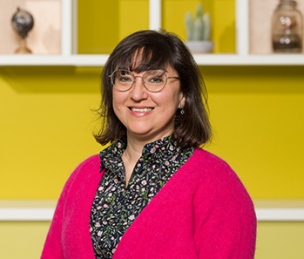Primary tabs
- Research
-
I investigate the neurocognitive properties of language comprehension and production, asking some of the following questions:
- how are concepts cognitively and neurally represented across languages?
- to what extent do language and gesture share modality-independent neural systems?
- does morphosyntactic structure require universal or, rather, language-specific neurocognitive mechanisms for typologically different languages (e.g.: Italian, Arabic, English, Polish)?
- what is the relative time course of conceptual preparation and speech planning in language production?
To address these questions, I employ behavioural, computational linguistic and neuroimaging methods (fMRI, MEG; both univariate and multivariate approaches to time data series [representational similarity analysis and pattern classification]).
Before joining the MPI, I worked at the Institut des Sciences Cognitive-CNRS in Lyon, at the MRC-CBU, the University of Cambridge, UK, Humboldt University, and Freie University in Berlin.
Outreach: Writer and illustrator for the MPI TalkLing, and Het Talige Brein, the popular science blogs of the Max Planck Institute for Psycholinguistics (since April 2021): https://www.mpi-talkling.mpi.nl/?author=34&lang=en
"Do concepts have abstract meanings"? https://taalenhersenen.wordpress.com/2022/06/07/do-abstract-concepts-ha… https://www.mpi-talkling.mpi.nl/?p=1822&lang=en
"Do we understand words by the company it keeps?". https://www.mpi-talkling.mpi.nl/?p=1599&lang=en
"New COVID-19-related words as social antibodies keeping our brain busy". https://www.mpi-talkling.mpi.nl/?p=1153&lang=en
- Peer-review activity
-
I have been reviewing papers for journals, including Journal of cognitive neuroscience, Cerebral Cortex, Journal of Neuroscience, Neurobiology of Learning and Memory, Brain and Language, Language Cognition and Neuroscience, Plos One, Cortex, Scientific Reports, NeuroImage.
- Invited Talks
-
"Mapping semantic vector spaces onto the brain’s cortex: from neural readout to neuro-semantic theory." May 2023, Universitá di Pavia, Italy.
"Towards a neurobiologically informed theory of language production". May 2023, Lund University, Sweden.
"Cascading neural events in language production: Neuromagnetic evidence". 2022. Carnegie Mellon University, USA.
"Neurocognitive representations of linguistic complexity across different languages". 2019. Radboud University, Nijmegen. Invited talk.
"Representational Similarity Mapping of lexico-semantic complexity in the human brain: evidence from fMRI". May 2019. H-Heine Universität Düsseldorf.
"Spatiotemporal patterns of language comprehension: neuromagnetic evidence". June 2019. H-Heine Universität Düsseldorf.
"Neurocognitive representations of lexical complexity". 2019. University of Pisa.
"Fronto-temporal networks for automatic visual recognition: MEG evidence". 2019. MPI.
"Comparing models of semantic representations in the brain". 2018. Freie Universität, Berlin.
"Neural representations of morphosyntactic complexity". 2017. University of Potsdam, Germany.
"Cross-linguistic patterns of semantic/pragmatic and linguistic functions in the dual system". 2017. University Claude Bernard, Lyon.
"Cortical reflections of conceptual knowledge as revealed by RSA". 2017. University of Aix-Marseille.
"Is computational linguistics relevant to neuroscience? How different computational metrics of lexical semantic information are reflected by brain activity patterns during the semantic/pragmatic interpretation of language". 2017. Cambridge University.
"Representational similarity in the brain and computational language processing: new clues about the neural encoding of word meaning". CNS, 2017 Data Blitz.
"Where and how does the brain represent words? A critical review." 2016. Freie University, Berlin, Germany.
"Neurocognitive substrates of derivational morphology: evidence from Italian". 2016. Potsdam University, Germany.
"Word co-occurrence statistics and conceptual taxonomies predict dissociable fMRI information patterns in the brain semantic systems". CNS 2016. Data Blitz and Postdoctoral Award CNS 2016.
"Representational patterns of semantic relationships between and within words". 2015, CNC-ISC, Lyon, France.
"More than words: lexical-semantic relationships in the brain semantic systems". 2015. UCL.
"Co-occurrence and taxonomy are reflected by the similarity patterns in distinct cortical networks". 2014. Cambridge University, UK.
"Neurobiological systems for nonconcatenative morphology in Arabic". 2013. University of Cambridge, UK.
"Representational similarity among conceptual categories in the fronto-temporal language systems". 2012. Freie Univerity, Berlin.
"Latent semantic analysis reflects the categorical structure of concepts in the left inferior frontal gyrus". 2011. University of Cambridge, UK.
"Time course of speech act processing". 2010. Vrije Universiteit Amsterdam, The Netherlands. Invited talk.
"Neurophysiological correlates of speech act planning". 2010. MRC-CBU, UK.
"Cortical dynamics of intentional speech-acts: a MEG study". 2009. University of Melbourne. Invited Talk.
"Dinamiche spazio-temporali dell’attività cerebrale durante la produzione e la percezione del linguaggio: nuove prospettive aperte dalla magnetoencefalografia". 2006. Universitá di Vercelli, Italy.
"Gathering Common Ground on the negotiated topic: the role of contrastive markers in Italian". 2004. North-eastern Illinois University, Chicago. Invited Talk.
- Teaching activity
-
July 2022: "Trends in the Cognitive Nuroscience of Language", Course Leader for the International Radboud Summer School, Radboud University, MPI, DCCN, Nijmegen. https://www.ru.nl/radboudsummerschool/courses/2022/registration-longer-…
Spring Semester 2020: "Neurocognition of reading". Lecturer. Heinrich-Heine-Universität Düsseldorf.
August 2019: "Trends and Topics in Neurolinguistics", Course Leader for the International Radboud Summer School, Radboud University, MPI, DCCN, Nijmegen.
April 2019: “The representation of concepts in the brain”. MA course. Lecturer. Heinrich-Heine-Universität Düsseldorf.
2018: "Representational Similarity Analysis and the representations of semantic categories". MA/PhD course. Guest Lecturer. Freie Universität, Berlin.
2017: "Neurocognition of language: the meaningful brain". MA/PhD/early postdoc course. Lecturer. Humboldt Universität zu Berlin, School of Mind and Brain.
2013-2016: Cambridge MA student supervisor for the MA course "Psychology and Neurocognition of Language" (Head: Mirjana Bozic; Lorraine Tyler, Matt Davis).
2010-2012: "Neurobiology of Language". Guest Lecturer. Cambridge University, Dept. of Applied Linguistics.
2001: "Computational models of language". Guest Lecturer. University of Pisa.
2000: Computational Linguistics: Seminar for Staff Members and PhD students: University of Pavia: "Automatic dialogue act recognition".
-

Share this page